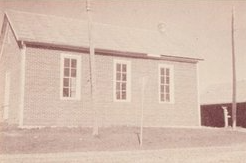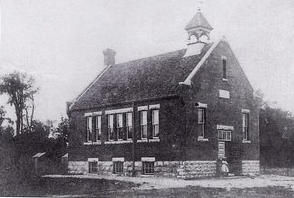Bennington
Bennington was named by one of the earliest settlers in the community, Mr. Hall (sometimes referred to as Mr. Hull), great-great-grandfather of Frank Cowan. He called the hamlet after his native home, Bennington, Vermont. Bennington was a bustling and dynamic community boasting general stores, a blacksmith, a post office, a community hall, a cheese and butter factory, a flax mill, a steam-powered sawmill, hotels, a train station, and schools.
The first school in the Bennington area was Pelton’s at the southwest corner of Lot 20, Concession 3, facing north. 1864 School Section #3 was established, with Augustus Wilson as chairman and James Pelton as secretary. The school opened on February 1, 1864; in 1906, it was replaced with a new brick building and operated as an elementary school until 1966. Later, it was converted to residential use.
The school and the hall played a crucial role in developing the community in Bennington. Bennington Hall was constructed in 1880; community members contributed labour and funds to its construction. Over the years, the Hall hosted various community groups' meetings and activities, including the Excelsior Club, a branch of the United Farm Women of Ontario; the Farmers’ Club; Junior Farmers; and the Women’s Missionary Society.
Bennington joined in the heyday of cheesemaking in Oxford County. The Bennington Cheese and Butter Association was incorporated in December 1894 on the north half of Lot 20, Concession 2. The Bennington Cheese and Butter Co. brought coal and shipped cheese from Bennington Train station. The factory operated until the early 1960s.



